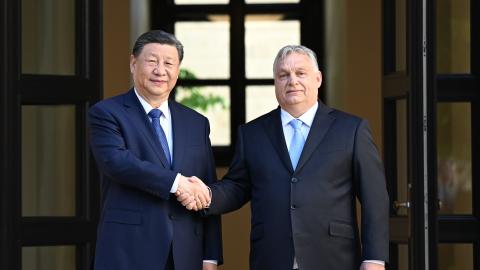Hungary’s flowering relationship with China, on full display during Chinese President Xi Jinping’s triumphant two-day visit to Budapest, is a blazing three-alarm fire. Will America conservatives respond to the call?
For many on the American right, Hungarian Prime Minister Viktor Orbán’s defense of traditional values against “woke” ideology absolves all other sins. We must not fall for Orbán’s games. Orbán’s devotion to deepening relations with China makes him an unreliable partner. He has lauded China, which labors tirelessly to end American global leadership, as “a pillar of the multipolar world.” With friends like these, who needs enemies?
Feted in style, Xi was met in Hungary with red carpets, media praise and protection from pesky protestors, courtesy of his host. China and Hungary signed at least 16 cooperation agreements, with a focus on energy and infrastructure, while also upgrading diplomatic ties to an “all-weather comprehensive strategic partnership for the new era.”
The Orbán-Xi romance is long-standing. During the pandemic, Hungary was the first country in the European Union to approve vaccination of its population using the Chinese-made Sinopharm shot. Shortly after the jab was approved, the head of the China Centers for Disease Control, in a rare moment of Chinese Communist Party candor, admitted that it didn’t work well.
In 2015, Hungary made waves by becoming the first nation in the European Union to sign on to China’s Belt and Road Initiative (BRI). The Belgrade to Budapest railway, scheduled to be completed next year, is BRI’s signature project in Europe. In 2020, Hungary classified as secret the terms of the development’s Chinese loans, which fund 85 percent of the project, for a decade. The obfuscation speaks volumes.
That the rail line links Beijing’s foremost friends on the continent is no coincidence. The goal is to modernize the railway between Hungary and Serbia and connect to the Greek port of Piraeus, which is two-thirds owned by China’s state-owned COSCO shipping. This is China’s new “Maritime Silk Road,” allowing Chinese goods and influence to pour into the heart of Europe.
The Hungarian government has welcomed Chinese investments and sway with open arms. Beijing is now Hungary’s largest inward investor, and the nation of under 10 million will see 17 flights a week to China by the middle of this year.
In December, Chinese manufacturer BYD announced it had chosen Hungary as the location for a new electric vehicle assembly plant. Chinese electric vehicle battery makers are also opening plants in Hungary at breakneck pace. Hungarian authorities hope to overtake the U.S. as the second-largest producer of lithium-ion batteries, behind China of course. Last year, the Hungarian government denied leaked reports detailing Chinese plans to build hubs in Hungary for the dissemination of raw chemicals for numerous European production facilities.
Chinese firms are also playing a leading role in the buildout of Hungary’s 5G telecom system. In 2020, Huawei opened a research center in Budapest. In 2023, the Hungarian telecom company 4iG signed a MOU with China’s Huawei.
At a time when many countries in Europe can’t run fast enough from Chinese-made 5G, Hungary’s embrace stands apart and is a direct repudiation of the U.S. and its security concerns. Chinese surveillance cameras and facial recognition software have likewise established a significant beachhead in Budapest, importantly with Hungarian law enforcement. A March bilateral agreement paved the way for China to station its own police inside Hungary. China will certainly use this new power to target dissidents and collect intelligence inside Hungary.
Even China’s material support for Russia’s war against Ukraine was not enough to dissuade Orbán from hosting a state visit. The prime minister has publicly supported China’s peace plan for the war. The plan is a sham, but apparently Hungary isn’t in on the joke.
A generous reading is that Hungary embodies the push to inhabit a middle ground between America and China. But in a world of autocrats consolidating their power against the democratic West, this supposed third way is a mirage. European fence-sitters weaken the U.S.
We need to be honest about our China problem in Budapest. American conservatives have the standing and muscle to force a course correction in Hungary — and the time is now.



















